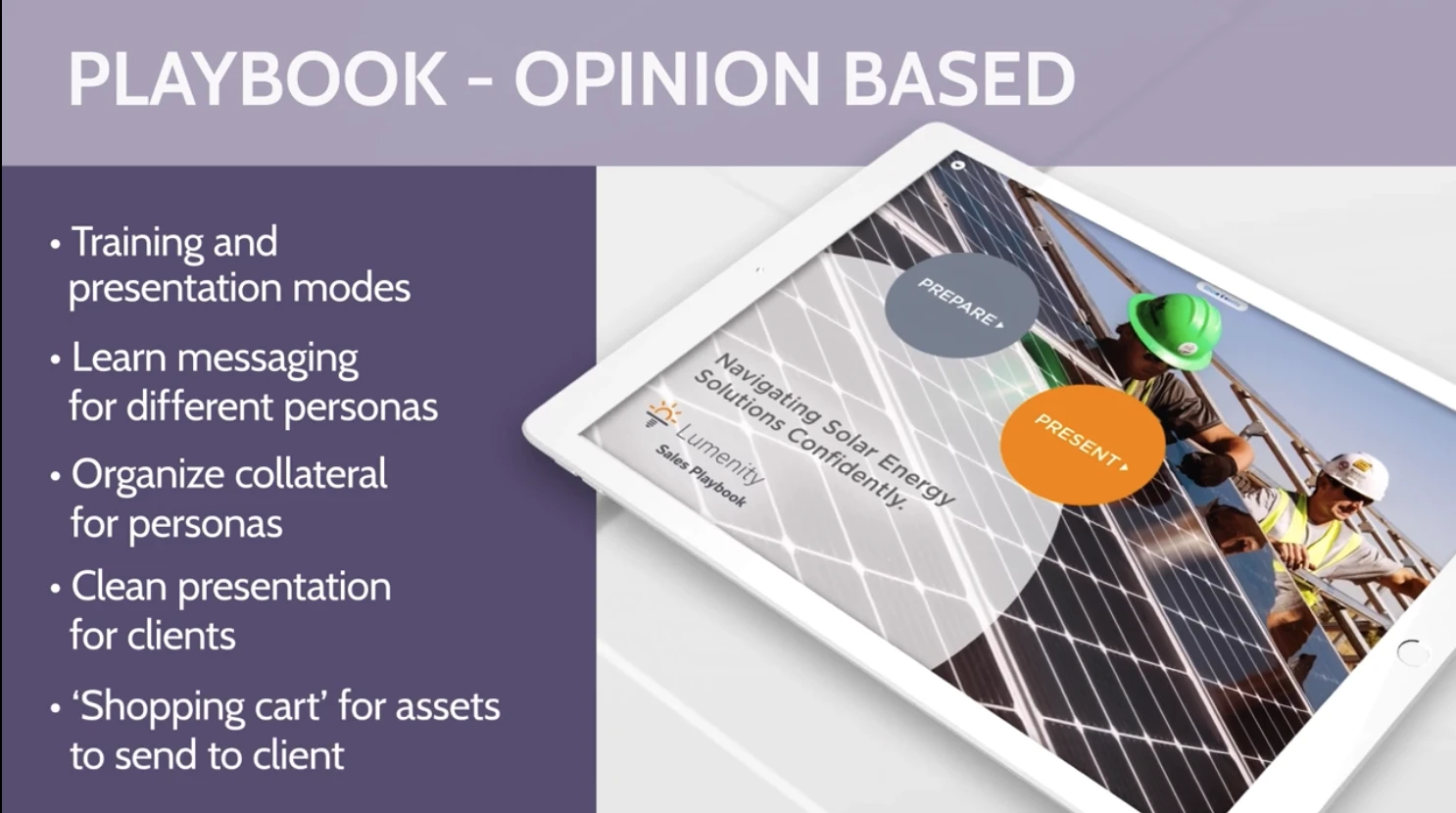Sales teams need every advantage they can get. To keep reps nimble, one of the most powerful tools in a sales organization’s arsenal is the everything-in-one-place sales playbook. Why are playbooks necessary, and how can modern technology amplify their effectiveness? Let’s explore how they can transform your sales team’s success.
Get everyone on the same page
How many times have you heard a sales rep say, “I have my own way of selling.” Style is one thing. But content and your company’s product messaging are another. It’s important that all of your sales team starts from the same foundation. That makes sales playbooks essential to ensure:
- Consistency – All sales representatives should be aligned with the company’s messaging, product knowledge, and best practices.
- Efficiency – Playbooks streamline the sales process, allowing reps to focus on selling rather than searching for information.
- Scalability – As companies grow, playbooks help maintain quality and consistency across expanding sales teams.
- Adaptability – Well-designed playbooks can be quickly updated to reflect market changes, new products, or competitive shifts.
- Performance – By providing a framework for success, playbooks help both new and experienced reps improve their performance.
The interactive app revolution in sales training
Traditional static playbooks are being replaced by interactive apps, bringing numerous benefits to sales training:
One playbook. Two modes.
Modern playbook apps can support the sales reps before and during the sale with two modes:
Training mode
Allows reps to familiarize themselves with content, messaging, and strategies in a risk-free environment.
Presentation mode
Provides a clean, professional interface for client-facing interactions.
This dual functionality ensures that reps are well-prepared before engaging with prospects and can present information effectively during meetings.
Persona-based learning
Interactive playbooks excel at educating reps on different buyer personas.
Demographic personas
These are based on attributes such as age, gender, job title, industry, company size, and location. For example, a “CTO of a mid-sized healthcare company” or a “millennial marketing manager in a tech startup.”
Psychographic personas
These delve deeper into the psychological characteristics of buyers, including their values, interests, attitudes, and lifestyle choices. For instance, an “innovation-driven, early-adopter” or a “risk-averse, process-oriented decision-maker.”
With these comprehensive personas in mind, interactive playbooks offer several advantages:
- Reps can explore messaging tailored to specific roles, industries, or psychographic profiles. For example, the language used for a tech-savvy startup founder might differ significantly from that used for a traditional corporate executive.
- The app can highlight motivating factors and pain points/solutions for each persona. A cost-conscious small business owner might be more interested in ROI and affordability, while an enterprise-level decision-maker might prioritize scalability and integration capabilities.
- Content is organized and easily accessible based on the prospect’s profile. This might include case studies from similar industries for demographic matches, or white papers providing clinical data for psychographic matches.
- Interactive elements can guide reps through different conversation paths based on the persona, helping them ask the right questions and provide the most relevant information.
This persona-based approach allows reps to guide conversations more effectively, addressing the unique needs and concerns of each potential client. By understanding both the demographic and psychographic aspects of their prospects, sales representatives can create more personalized and impactful interactions, increasing the likelihood of successful outcomes.
Competitive intelligence at your fingertips

In a competitive market, having the latest insight into your competition can be critical to making the sale. Interactive playbooks can provide:
- Quick access to competitive comparisons
- Prepared responses to common objections
- Up-to-date market intelligence
Reps can confidently handle tough questions and position their offerings effectively against competitors.
Leveraging playbooks within sales enablement platforms
While interactive playbooks are powerful on their own, integrating them with a comprehensive sales enablement platform amplifies their impact. Sales enablement platforms serve as a central repository for all sales content. The playbook can then easily access and utilize approved and updated marketing material. By making everything centralized, you create a single source of truth for all your reps.
Content tracking and analytics
How do you know if anyone is using the playbook? Modern platforms provide insights into content usage and effectiveness.
- Track which materials are being used most frequently
- Analyze which content correlates with successful deals
- Identify gaps in the content library
These analytics help sales and marketing teams continuously refine their strategies and materials.
Seamless distribution, updates, and version control
As products evolve and market conditions change, sales enablement platforms make it easy to:
- Ensure security and data protection
- Push updates to all users simultaneously
- Ensure outdated content is archived or removed
- Maintain version control across the organization
This agility keeps the entire sales team aligned and up-to-date with minimal effort.
Accelerate onboarding
For companies experiencing rapid growth, onboarding new sales reps quickly is crucial. Interactive playbooks shine in this area:
Self-paced learning – New hires can explore the playbook at their own pace, focusing on areas where they need the most development.
Simulation capabilities – Some advanced playbooks include role-playing scenarios, allowing reps to practice their pitches in a safe environment.
Best practices showcase – Interactive playbooks can feature recorded sales calls or presentations from top performers, allowing new reps to learn from the best in the organization.
Just-in-time learning – Reps can quickly access relevant information or refreshers right before client meetings, boosting confidence and preparedness.
Gamification elements – Incorporating gamification, such as points, badges, or leaderboards, can increase engagement and motivation during the onboarding process.
By providing a comprehensive, interactive learning tool, companies can significantly reduce the time it takes for new reps to become productive members of the team.
Enhancing client interactions
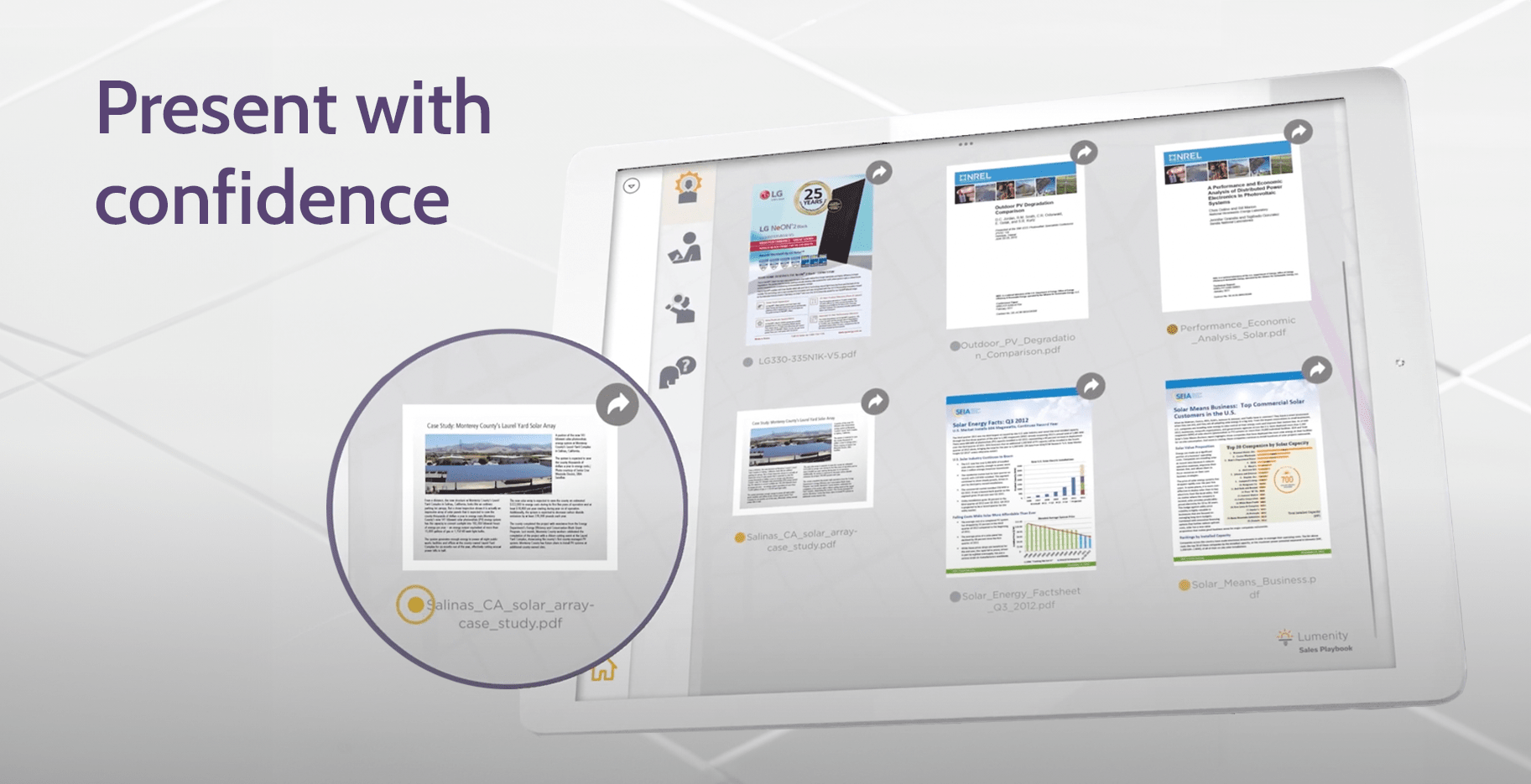
Interactive playbooks don’t just benefit the sales team internally, they also improve the quality of client interaction.
Polished, branded client presentations
In presentation mode, playbooks offer a polished, professional interface:
- Persona names and internal notes are hidden
- The focus is on client-relevant information and visuals
- Navigation is intuitive, allowing for smooth transitions between topics
‘Shopping cart’ for assets
Many interactive playbooks include a feature for collecting and sending relevant content to clients.
- Reps can add documents, videos, or other assets to a virtual ‘cart’ during the meeting
- At the end of the presentation, selected materials can be instantly shared with the prospect
- This ensures that follow-up materials are sent promptly and accurately
Content tracking
Beyond just sharing content, advanced playbooks can track client engagement.
- See which shared materials the prospect has viewed
- Understand the time spent on each document
- Guide follow-up conversations and tailor future interactions
Align with established sales methodologies
One of the key strengths of interactive sales playbooks is their ability to seamlessly integrate with and reinforce various established sales methodologies, such as Sandler, SPIN, Challenger, and others. A well-designed playbook can be tailored to support and enhance these methodologies.
Consistent application
Ensures all team members are applying the chosen methodology correctly and consistently.
Reinforced learning
Provides ongoing reinforcement of methodology principles, enhancing retention and application.
Adaptability
Allows for easy updates as methodologies evolve or as the organization refines its approach.
Measurable results
Enables tracking of methodology adoption and its impact on sales performance.
Customization
Allows organizations to blend elements from different methodologies to create a unique, tailored approach.
Let’s explore how playbooks can be customized for some popular sales approaches.
Sandler Selling System
Interactive playbooks can be structured to guide reps through the Sandler Selling System’s seven-step process:
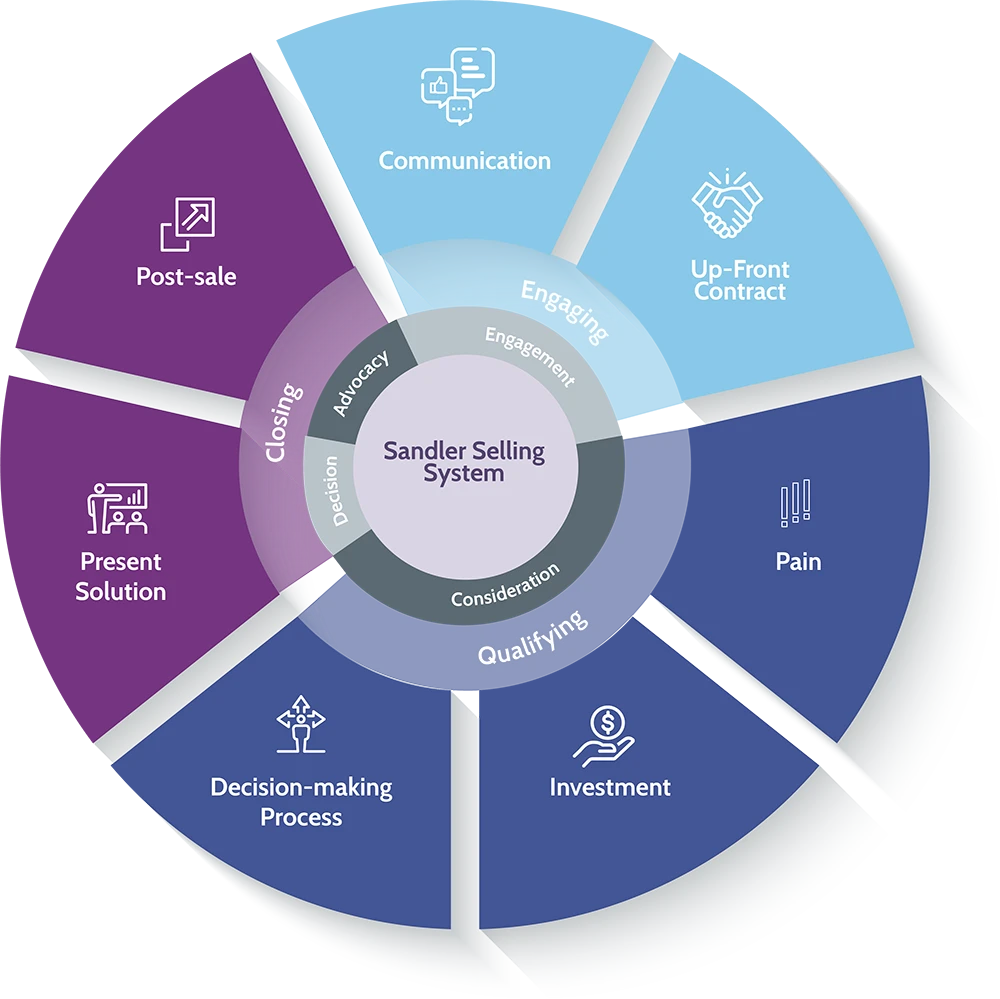
- Incorporate role-playing scenarios for building rapport and setting expectations (Bonding and Rapport stage)
- Provide question templates to uncover pain points (Pain stage)
- Offer scripts and strategies for discussing budget (Budget stage)
- Include decision-making process analysis tools (Decision stage)
SPIN selling
For organizations using SPIN Selling, playbooks can:
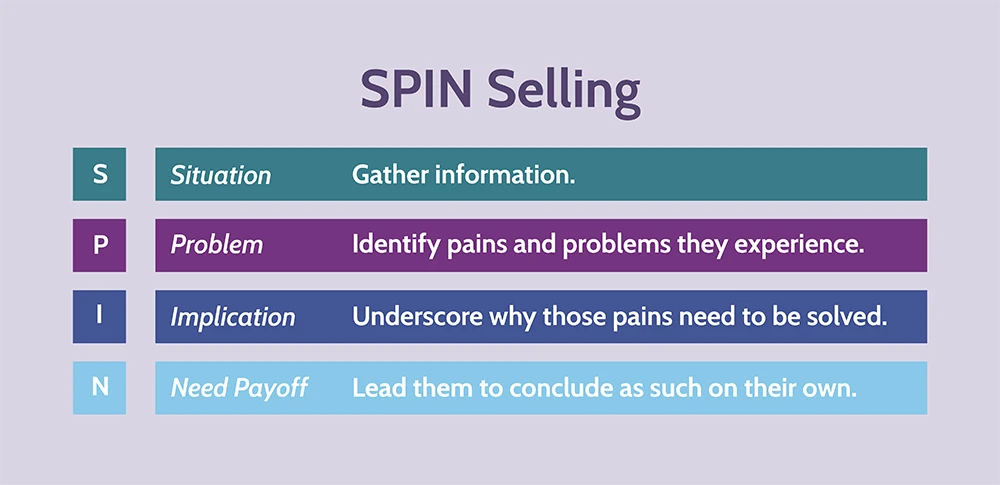
- Offer a database of Situation, Problem, Implication, and Need-payoff questions
- Provide interactive exercises to practice transitioning between question types
- Include case studies demonstrating successful SPIN conversations
The Challenger Sale
Playbooks aligned with the Challenger sales method might:
- Offer modules on developing and delivering insights to prospects
- Provide tools for tailoring the sales message to different stakeholders
- Include exercises on constructive tension and reframing customer thinking
Solution selling
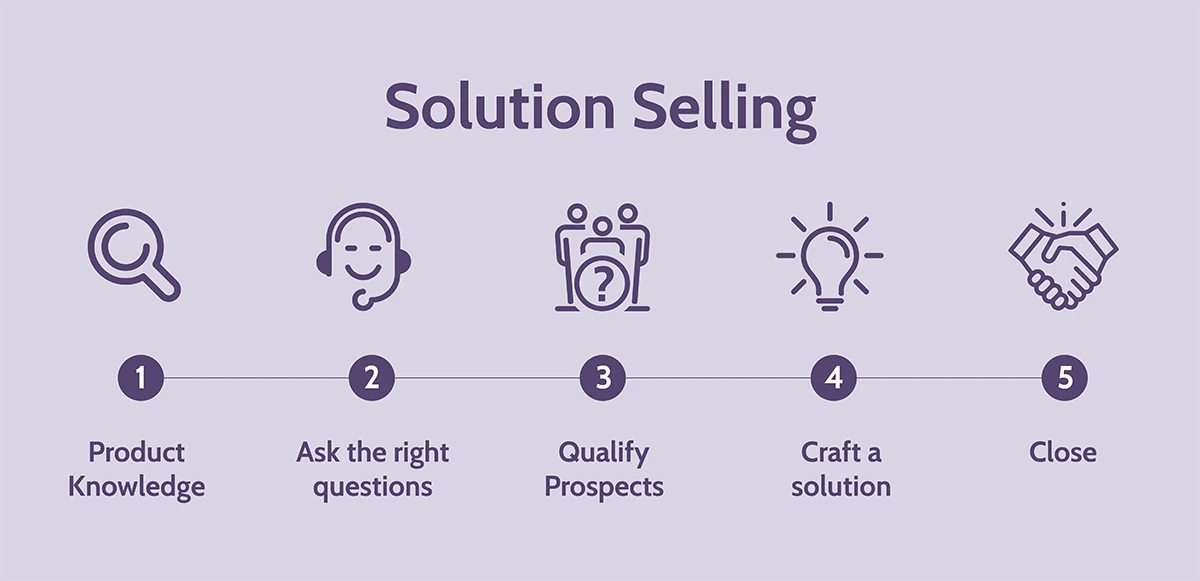
For teams using Solution Selling, playbooks can:
- Guide reps through the process of defining pain points and desired outcomes
- Offer templates for creating comprehensive solution maps
- Provide strategies for involving decision-makers early in the process
Force Management
Playbooks supporting the Force Management methodology might:
- Include tools for conducting thorough discovery sessions
- Offer frameworks for articulating value propositions
- Provide guidance on negotiation strategies and closing techniques
By aligning interactive playbooks with established sales methodologies, organizations can ensure that their chosen approach is not just taught in training sessions, but actively supported and reinforced in day-to-day sales activities. This integration helps transform theoretical knowledge into practical skills, ultimately leading to more effective sales conversations and improved results.
Playbooks: Ready for modernization
Interactive sales playbooks, especially when integrated with robust sales enablement platforms, are revolutionizing how sales teams prepare, present, and perform. By providing consistent messaging, persona-based guidance, competitive intelligence, and seamless content management, these tools are becoming indispensable in the modern sales landscape.
As companies continue to grow and markets evolve, the ability to quickly train new reps, adapt to changing conditions, and deliver personalized, impactful presentations will be key differentiators. Interactive playbooks are not just a trend; they’re the future of sales enablement, empowering teams to sell smarter, faster, and more effectively than ever before.
Ready to get started on your sales playbook? Complete the form to share your ideas with our team!
Ready to power up your sales team?
Submit this form to schedule a consultation, or contact Don Poe directly at 303-449-6086.

